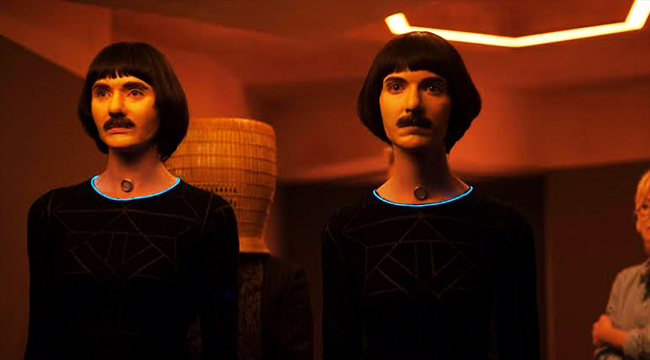
A review of tonight’s Legion coming up just as soon as I teach you how to use the bathroom…
Jon Hamm opens up “Chapter 11” with an explanation of the nocebo effect, where a patient is made worse by something that shouldn’t change their condition at all, in an inverse of its more famous cousin, the placebo effect. We once again journey into the all-white room for a series of beautifully-shot and unsettling examples of the phenomenon, including a squad of high school cheerleaders who pass the same facial tic along to one another.
“And so my question to you,” the former Don Draper proposes, “is, if the idea of illness can become illness, what else about our reality is actually a disorder?”
Legion exists in a universe where superpowers — particularly the mental kind — are real, using them as metaphors for mental illness in the same way that Buffy once used monsters as metaphors for adolescent rites of passage. So not long after we witness the cheerleaders stricken by the same phantom tic, we see almost everyone in Division 3 frozen by the chattering teeth plague, which it turn out is passed on not by the Shadow King, but by the monk who’s been hiding from him. Nothing should be wrong with any of these people, yet here they are, still as statues, while the child soldiers have been led off, Pied Piper-style, leaving the place largely defenseless. What is madness, and what is telepathy? In Legion, they are one and the same.
It’s another visually inventive episode that feels a bit low in calories, particularly when we get to the obligatory sequence where David travels into the minds of his friends to free them from the monk’s spell. This is familiar genre stuff, the kind every show like this eventually tries because it’s a more interesting way to delve into the psyches of the characters than to, say, put them in therapy for an hour. And both Ptonomy’s vision of himself as an amnesiac florist, and Melanie’s of herself as the omnipotent god of an ’80s-style text adventure game, were remarkable to look at, especially as the show’s disabled Minotaur shuffled into Melanie’s game(*) and the sentences began floating in vertically, one word at a time. But those sequences also feel like a missed opportunity, in that we don’t come out of them knowing any more about either character than when we went in. Ptonomy in particular is among the show’s more thinly-written characters; basically, all we know about him are his powers and the terrible story of his mother’s death. The idea that the memory stylist with the tragic origin would wish to forget everything doesn’t give us new insight, any more than telling us that Melanie — the ordinary human in a world full of extraordinary mutants, who keeps having her husband torn from her for reasons beyond her control — wishes she had the power to control everything. Both feel in-character, but so much so that the scenes were emotionally redundant, albeit cool to look at.
(*) That’s twice we’ve seen the minotaur affiliated with Melanie now, and the disgusting hatchling creature from the season premiere crawls into Ptonomy’s ear while he’s sleeping earlier in this episode. At a certain point, will the Hammeo scenes be revealed as something more than just a clever way for Legion to explain the Psychological Concept of the Week? Might this be a real thing — by whatever loose boundaries of realism this show has — with Hamm appearing as more than a voice by the end of things?
The episode does better by other members of the team, particularly Kerry Loudermilk and her struggles to adjust to living in the real world all the time. It’s both funny and sad to see how little she knows about basic living, but also sweet to see Cary trying to walk his little sister through it. And though we don’t get to see more than a brief glimpse of Syd’s own mental prison in this hour, with David walking through a blizzard as our cliffhanger, the fact that she’s spending so much time as the Division 3 cat, even after David’s return, suggests an ongoing disconnection between Syd and the current state of things.
And after last week’s episode first started to address Lenny as a character independent of the Shadow King himself, this one hit much harder at the idea that she’s now trapped as his immortal plaything, unable to do or be anything other than what he wants, and to go wherever he goes. The astral plane pool scene was mainly another negotiation between David and Farouk, but it was most affecting for Aubrey Plaza’s performance, and for the way Lenny kept attempting suicide in the background of the conversation, to no avail. (When she shoots herself in the head, for instance, only bubbles come out.) There was some question last season about whether Lenny was ever a real person, or always a creation of Farouk, but she’s just as much frozen in place as all the victims of the monk. And the monk himself is able to commit suicide where Lenny couldn’t, going off the edge of Division 3 headquarters, thus ending the terrible run his entire order endured after they were asked to hide Farouk’s body.
Caregivers like to say that suicide is a permanent solution to a temporary problem, but in the world of Legion, where you can be mentally imprisoned for all eternity in your worst nightmare, it’s only common sense.
What did everybody else think?
Alan Sepinwall may be reached at sepinwall@uproxx.com. He discusses television weekly on the TV Avalanche podcast. His new book, Breaking Bad 101, is on sale now.
